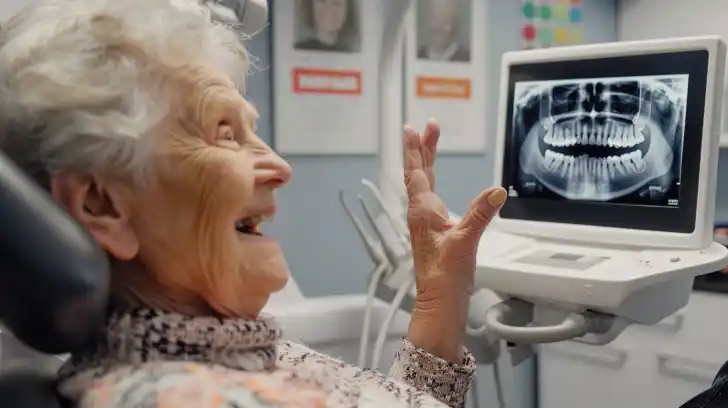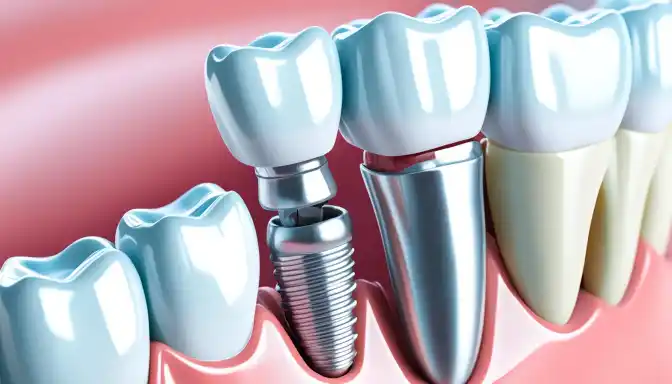Seniors Discover Little-Known Way to Get Dental Implants for Free
Published on
8 minute read

For seniors all over the U.S., keeping a bright smile can be tough, especially with the steep prices of dental implants. Thankfully, there are special resources aimed at helping seniors get free or affordable dental care.
Many programs are designed to help seniors get the dental implants they need without breaking the bank. These options increase access to important dental services. They also help seniors feel confident and improve their life quality.
Key Takeaways
- Free dental implants can become accessible for low-income seniors through various assistance programs and grants.
- Seniors can benefit from government and non-profit initiatives focused on affordable dental implants.
- Exploring clinical trials and research programs may offer seniors low-cost dental implants.
- Charitable institutions and foundations are key players in providing discounted or free senior dental care services, including implants.
- Understanding the range of financial assistance available can greatly reduce the burden of dental implant costs for seniors.
Exploring Government and State-Funded Programs for Senior Dental Care
Many seniors worry about the cost of oral health. Yet, there are paths to help with these costs. Understanding government and state-funded programs is key for those seeking dental implants. Through Medicaid dental implants options, seniors can find the help they need.

Certain insurance policies cover dental implant surgery, especially if it’s medically needed. This coverage varies by state. It’s important for seniors to check Medicaid and dental insurance options in their state.
Medicaid and Its Dental Coverage for Seniors
Medicaid provides help for dental implants, but coverage varies by state. In some areas, if a doctor says dental implants are needed for health, Medicaid may help pay. However, this help might be less for seniors than younger people. Yet, it’s a crucial help for seniors in need.
Unveiling Dental Assistance Programs for the Elderly
Several programs exist solely to help older adults with dental implant costs. These are often part of government dental assistance. They offer financing options to make implants more affordable for seniors.
Grants and Services from the Dental Lifeline Network
The Dental Lifeline Network provides dental implant grants for seniors. It has volunteer dentists and support from the ADA. This organization helps those who can’t afford care. Its grants are vital for elderly dental care.
Dental health is critical in one’s later years. The programs mentioned offer essential support. They help seniors maintain oral health without worry about cost. This kind of care is key to better life quality for seniors.
Dental Implants for Seniors through Clinical Trials and Research Programs
Many seniors are now interested in free dental implants from clinical trials and low-cost dental implants. This trend is due to the progress in dental technology. Clinical trials often look for seniors to join in and try new treatments. Yet, it’s important for folks to really understand what these dental implant trials involve. They should consider both the benefits and the factors of being part of such trials.

Joining clinical trials helps advance dental medicine. It also lets patients get dental implants at significantly reduced costs or for free. These trials are run by universities, hospitals, or research groups. They test new implant methods and materials. Seniors get access to the latest dental care. At the same time, they provide valuable information that shapes future treatments.
Here’s what seniors need to know about joining dental implant trials:
| Consideration | Details | Benefits |
|---|---|---|
| Eligibility Criteria | Medical and dental history review, age considerations, overall health assessment. | Free or discounted dental implants for qualifying participants. |
| Risks and Consent | Thorough explanation of potential risks and an informed consent process. | Participants are well-informed and can make educated decisions about their involvement. |
| Procedure and Follow-up | Details on the implant process, the materials being tested, and regular check-ups. | Access to latest implant techniques and long-term dental care post-procedure. |
| Cost Implications | Understanding of what expenses, if any, may not be covered by the trial. | Clarity on the scope of low-cost dental implants potentially leading to major savings. |
Seniors should do their homework before jumping into dental implant trials. They should look into the institutions conducting the trials. Reading reviews from past participants and talking to a dentist are good steps. While the chance to get free dental implants from clinical trials is appealing, the quality and safety of the care are critical.
Clinical trials offer seniors a way to handle dental issues affordably. This also helps push dental medicine forward. By being careful and choosing reputable trials, seniors can really benefit from these studies.
Senior-Specific Financing and Discount Opportunities
Many seniors find the cost of dental care high. Thankfully, there are affordable options available. These include low-cost dental implants and dental implant grants made especially for seniors. These options help lower costs and make important dental services accessible.
Affordable Dental Implant Providers and Sliding Scales
Finding affordable dental implant providers is important for many seniors. Sliding scale dental care is one way to make this possible. It adjusts prices based on a person’s income. This helps seniors get the dental care they need without the stress of high costs.
Navigating Dental Implant Payment Plans and Insurance Options
Dental implant payment plans and insurance can help manage costs. Seniors should look into financing options designed for their budgets. This helps make dental payments manageable and realistic.
Charitable Foundations Offering Support for Senior Oral Health
Charitable dental organizations are key in supporting senior dental health. They offer grants and services. Their work shows a strong commitment to helping seniors access necessary dental care, overcoming financial barriers.
| Organization | Services Offered | Eligibility Criteria |
|---|---|---|
| Table Example | ||
| Donated Dental Services | Free dental implants and comprehensive care | Seniors with financial hardship |
| Give Back a Smile | Restorative dental work for seniors in need | Qualifying cases, often with a focus on senior victim of domestic abuse |
Seniors can significantly lower their dental implant costs through various assistance programs. By doing so, they can enjoy the benefits of a healthy smile without financial worry.
Dental Implants for Seniors: Weighing the Alternatives and Benefits
Many seniors look into tooth replacement options and often find dental implants appealing. They offer strong stability and a natural look. It’s important to look at different dental implant alternatives too. These can suit various lifestyles and budgets. Whether one prefers traditional dentures or modern implants, knowing each option is key.
Dentures and bridges are other popular choices. Yet, dental implants often work better, especially for long-term oral health. The materials used in implants add to their success. They are durable and act like real teeth.
| Criteria | Dental Implants | Dental Bridges | Dentures |
|---|---|---|---|
| Longevity | Up to 25 years or more | 5-15 years | 5-8 years |
| Stability | High (fixed to jawbone) | Moderate (attached to adjacent teeth) | Variable (depends on fit and adhesives) |
| Impact on Oral Health | Often improves jaw health | Can lead to damage of adjacent teeth | Can lead to bone loss over time |
| Care and Maintenance | Daily brushing, flossing, regular dental check-ups | Extra care for under bridge cleaning, regular check-ups | Removal for cleaning, adhesives may be needed |
| Initial Cost | Higher | Moderate | Lower |
| Success Rate | Over 95% | Varies | Varies |
Dental implants might cost more at first. But they can save money over time. This is because they last longer and need fewer repairs. New advances have also made them suitable for more seniors. Still, the right choice depends on personal health and dental goals.
Conclusion
Looking into senior dental care and deciding on dental implants can seem tough. It’s a big decision with costs involved. Yet, the path to better oral health and the benefits of dental implants is easier with the right help. Seniors can look into government aid, clinical trials, grants, and payment plans to help cover costs.
At the heart of this is the dental implant consultation. It’s a chance for seniors to get advice tailored to their needs. They can learn about the procedure, recovery time, and how long the implants will last. This helps them see a clear way forward to a better smile. With professional advice, making choices that fit their needs and budget is possible.
Choosing dental implants goes beyond just looking good. It’s about improving eating, keeping the jawbone healthy, and living better as one ages. It’s crucial for seniors to look closely at all their options, think about the benefits over time, and move forward with confidence. No matter the path taken, the goal is to help seniors keep their mouths healthy well into later life.
FAQ
How can seniors obtain dental implants for free?
Seniors with low income might get free dental implants. They can look into government programs, grants, clinical trials, or charities. These options focus on better oral health for the elderly.
Does Medicaid cover dental implants for seniors?
Medicaid’s dental implant coverage changes by state. It often depends if the procedure is needed for medical reasons. Always check your state’s rules.
What dental assistance programs are available for seniors?
Many programs help seniors with dental care. This includes government and the Dental Lifeline Network’s assistance. Seniors can apply for grants or get help from volunteer dentists.
Can seniors participate in clinical trials for dental implants?
Yes, seniors can join clinical trials for dental implants. These studies explore new materials and methods. They sometimes offer free or cheaper services for taking part.
What financing and discount opportunities exist for senior dental care?
Seniors have various financing options like payment plans. Some clinics offer lower fees or use a sliding scale. They work with nonprofits and the government.
How do dental implant insurance options work for seniors?
Insurance for dental implants might cover some costs for seniors. But, it’s important to understand your policy well. Know what it covers.
What charities offer dental implant support for seniors?
Charities like Donated Dental Services and Give Back a Smile help seniors. They may get dental implants for free or at a low cost. Eligibility and application are needed.
What are some alternatives to dental implants for senior dental care?
Besides implants, seniors can use bridges or dentures. They should weigh the costs, maintenance needs, and fit for their dental plan.
What are the benefits of dental implants for seniors?
Implants are stable and last long. They support good oral health, work well, and look good. This makes them a great choice for seniors.
What materials are used in dental implants?
Implants are usually made from titanium. This material works well with bone, creating a strong support for new teeth.
How successful are dental implants?
Most dental implants—over 90%—work well long-term. Success can vary, though. It depends on oral care and general health.
Are all seniors candidates for dental implants?
Not every senior can get implants. Things like bone health, oral condition, and some health issues matter. A detailed check-up can show if implants are a good choice.





